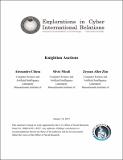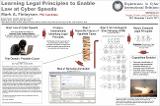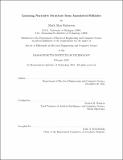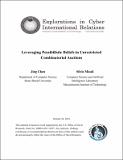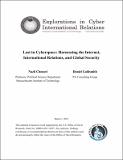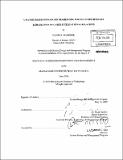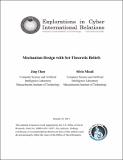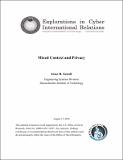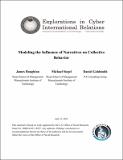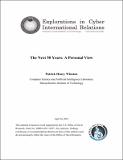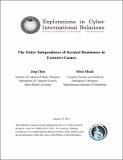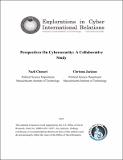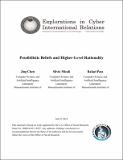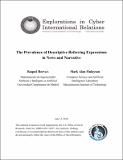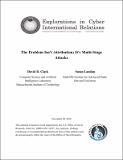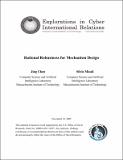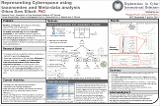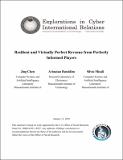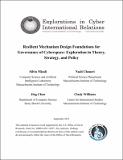Browsing Explorations in Cyber International Relations (ECIR) by Title
Now showing items 63-82 of 113
-
Knightian auctions
(© Massachusetts Institute of Technology, 2012-01-10)We study single-good auctions in a setting where each player knows his own valuation only within a constant multiplicative factor δ ∈ (0, 1), and the mech- anism designer knows δ. The classical notions of implementation ... -
Learning legal principles to enable law at cyber speeds
(Explorations in Cyber International Relations, 2011-12-07)Goal: Law at Cyber Speeds. If we are to enable the creation of Automatic Cyber Targeting Systems to respond in network time to cyberattacks, we must be able to do legal analyses at network speeds -
Learning narrative structure from annotated folktales
(Massachusetts Institute of Technology, 2012)Narrative structure is an ubiquitous and intriguing phenomenon. By virtue of structure we recognize the presence of Villainy or Revenge in a story, even if that word is not actually present in the text. Narrative structure ... -
Leveraging possibilistic beliefs in unrestricted combinatorial auctions
(MDPI AG/© Jing Chen, & Silvio Micali, 2016-10-26)In unrestricted combinatorial auctions, we put forward a mechanism that guarantees a meaningful revenue benchmark based on the possibilistic beliefs that the players have about each other’s valuations. In essence, the ... -
Lost in cyberspace: Harnessing the Internet, international relations, and global security
(Sage Journals/© 2012 Nazli Choucri, & Daniel Goldsmith, 2012-03-01)Early in the twenty-first century, new, cyber-based threats to the well-being of individuals, economies, and societies added a new dimension to the well-understood threats of the twentieth century. For the first time in ... -
A matrix based integrated framework for multi disciplinary exploration of cyber-international relations
(Massachusetts Institute of Technology, 2010)Cyberspace is the most pervasive and rapidly adopted communication media and the most disruptive until date. It is now indispensable for almost every facet of modern society and touches, practically, everyone by providing ... -
Mechanism design with set-theoretic beliefs
(© IEEE, 2011-10-22)In settings of incomplete information, we put forward (1) a very conservative -- indeed, purely set-theoretic -- model of the beliefs (including totally wrong ones) that each player may have about the payoff types of his ... -
Mixed context and privacy
(© TRPC, 2010-08-15)Users engaging online service providers (OSPs) such as Google, Amazon, and Facebook encounter environments architected by a single actor (the OSP), but comprised of content and executable elements potentially provided by ... -
Modeling the influence of narratives on collective behavior
(© The System Dynamics Society, 2013-07-21)This paper considers the problem of understanding the influences of narratives or stories on individual and group behavior. Narrative theory describes how stories help people make sense of the world, and is being used to ... -
The next 50 years: A personal view
(© Elsevier B.V., 2012-04-24)I review history, starting with Turing’s seminal paper, reaching back ultimately to when our species started to outperform other primates, searching for the questions that will help us develop a computational account of ... -
The order independence of iterated dominance in extensive games
(John Wiley & Sons, Inc./© Jing Chen, & Silvio Micali, 2013-01-22)Shimoji and Watson (1998) prove that a strategy of an extensive game is rationalizable in the sense of Pearce if and only if it survives the maximal elimination of conditionally dominated strategies. Briefly, this process ... -
Perspectives on cybersecurity: A collaborative study
(© Massachusetts Institute of Technology, 2015) -
Possibilistic beliefs and higher-level rationality
(© Massachusetts Institute of Technology, 2014-06-09)We consider rationality and rationalizability for normal-form games of incomplete information in which the players have possibilistic beliefs about their opponents. In this setting, we prove that the strategies compatible ... -
The prevalence of descriptive referring expressions in news and narrative
(© Association for Computational Linguistics, 2010-07-11)Generating referring expressions is a key step in Natural Language Generation. Researchers have focused almost exclusively on generating distinctive referring expressions, that is, referring expressions that uniquely ... -
The problem isn't attribution: It's multi-stage attacks
(© Association for Computing Machinery, New York, NY, USA, 2010-11-30)As a result of increasing spam, DDoS attacks, cybercrime, and data exfiltration from corporate and government sites, there have been multiple calls for an Internet architecture that enables better network attribution at ... -
Rational proofs
(© Association for Computing Machinery, New York, NY, USA, 2012-05-19)We study a new type of proof system, where an unbounded prover and a polynomial time verifier interact, on inputs a string x and a function f , so that the Verifier may learn f (x). The novelty of our setting is that there ... -
Rational robustness for mechanism design
(© Massachusetts Institute of Technology, 2009-11-10)The currently prevailing equilibrium-based approach to mechanism design suffers from a plurality of fundamental problems, and new conceptual frameworks are needed to solve or sufficiently alleviate them. In this paper, ... -
Representing cyberspace using taxonomies and meta-data analysis
(Explorations in Cyber International Relations, 2011-12-07)Problem: Modeling and mapping the landscapes of emerging research fields, such as cyberspace. • Most research fields are composed of many subfields which are related in intricate ways, therefore structural organization ... -
Resilient and virtually perfect revenue from perfectly informed players
(© Massachusetts Institute of Technology, 2010-01-13)We put forward a new extensive-form mechanism that, in a general context with perfectly informed players and quasi-linear utilities, • Virtually achieves optimal revenue at a unique subgame-perfect equilibrium; • Is ... -
Resilient mechanism design foundations for governance of cyberspace: Exploration in theory, strategy, and policy
(© Massachusetts Institute of Technology, 2013-09)Three related trends in world politics – shifting in power relations, increased diversity of actors and entities, and the growing mobilization and politicization of global constituencies are contributing to a global “tussle” ...
